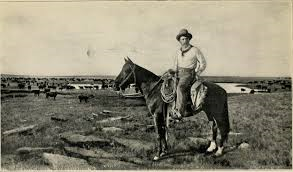Enter now to win a copy of
More Tales Behind the Tombstones
More Deaths and Burials of the Old West’s Most Nefarious Outlaws, Notorious Women, and Celebrated Lawmen

“He came to Dodge City when every man carried a gun, and the fittest survived. Beeson survived. But he is not fierce. He has not shot a man in several days.”
—Dodge City, Kansas, newspaper
Well-known Dodge City, Kansas, lawman and politician Chalk Beeson claimed he “drank bullets in his coffee for breakfast.” Few doubted how tough Sheriff Beeson was—particularly desperados raising hell in Ford County, Kansas.
Born in Salem, Ohio, in 1876, the highly esteemed man had a reputation for tracking even the most wanted criminals until they were caught. In November 1892, Chalk decided to ride into the Oklahoma Territory on his own to capture the notorious Doolin Gang. The gang had robbed the Spearville Ford County Bank in broad daylight and Chalk was not going to let them get away with it.
According to the August 12, 1912, edition of the Hutchinson, Kansas, newspaper the Hutchinson News, Chalk was so provoked by the Doolin Gang’s actions that he refused to wait until a posse was formed before he took out after the bandits. “He went to Oklahoma under an alias,” the newspaper article read, “and when he found the headquarters of the gang near Ingalls, he went to Guthrie and was appointed a deputy United States marshal, as he was far out of his jurisdiction as sheriff.”
One particular man in the gang Chalk was determined to arrest was Oliver Yantes, who was living with a woman in a cabin five miles from Ingalls. Chalk and a lawman he believed he could trust rode to the Yantes cabin and they hid along the path a few feet away from the entrance. Chalk concluded that Yantes would have to travel the path the following morning in order to take care of his horses.
When Yantes appeared, Chalk ordered him to throw up his hands, but instead of doing what the officer ordered, the bandit attempted to run. The plan had been for the deputy to shoot the desperado if he offered resistance while Chalk watched in case other members of the gang were there. The mist had dampened the caps of the deputy’s gun and when he failed to fire Chalk believed the lawman had been betrayed. Chalk fired on Yantes just as the woman ran from the house with the bandit’s revolver. Yantes was fatally wounded and died before Chalk could get him to Ingalls.
Chalk collected the reward offered by the state, the banks, the railroads, and the insurance company for the apprehension of any member of the Doolin Gang, dead or alive.
In addition to serving three terms as sheriff of Ford County, Chalk also served as a representative of the area in the state legislature from 1902 to 1906. Chalk’s abilities extended beyond his work in law enforcement and politics. He was an accomplished horse trainer and an expert musician. He could play the violin, trombone, and French horn. In 1885 Chalk founded the Dodge City Cowboy Band. The band was made up of more than eighteen men who played brass, percussion, and strings. The Dodge City Cowboy Band performed at the Long Branch Saloon, owned by Chalk, and entertained local citizenry by marching in parades. The band wore their best cowboy attire, including their six guns, which they fired in the air to punctuate a chord or musical phrase.
The tough and talented Chalk met his demise on August 8, 1912. Three days prior to his death, Chalk was sitting atop his horse at the C.O.D. Ranch, watching a nearby road construction crew work. His mount was suddenly spooked. The horse bucked and reared and before Chalk was able to get the animal under control it threw him hard against the saddle horn. Chalk never recovered from the serious injury.
Chalk Beeson’s well-attended funeral was held on August 11, 1912, at his ranch. Local businessmen and luminaries spoke highly of the contributions he had made to the community. Benevolent and fraternal society members, as well as civic and church representatives, turned out to brag about all he had done to make Dodge City a safe place to live. Mourner s reflected on Chalk’s fine character and of the positions of responsibility and trust he held in Ford County. One of Chalk’s friends at the funeral admitted that the community believed that “just one of Chalk Beeson’s strengths could withstand the worst kind of injury.”
To learn more about Chalk Beeson and other legendary western figures when you read More Tales Behind the Tombstones.

